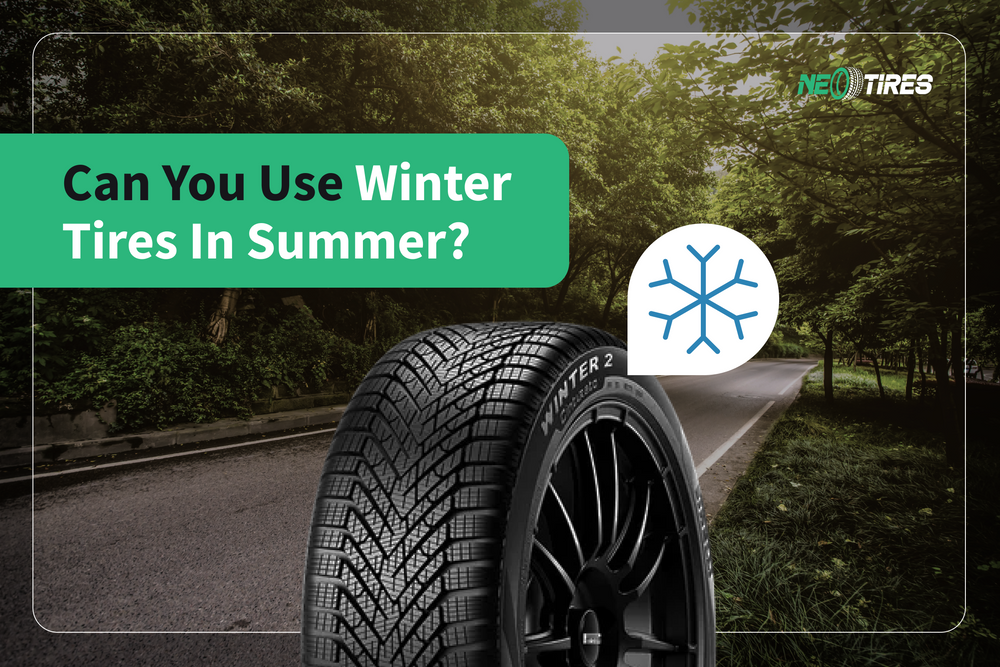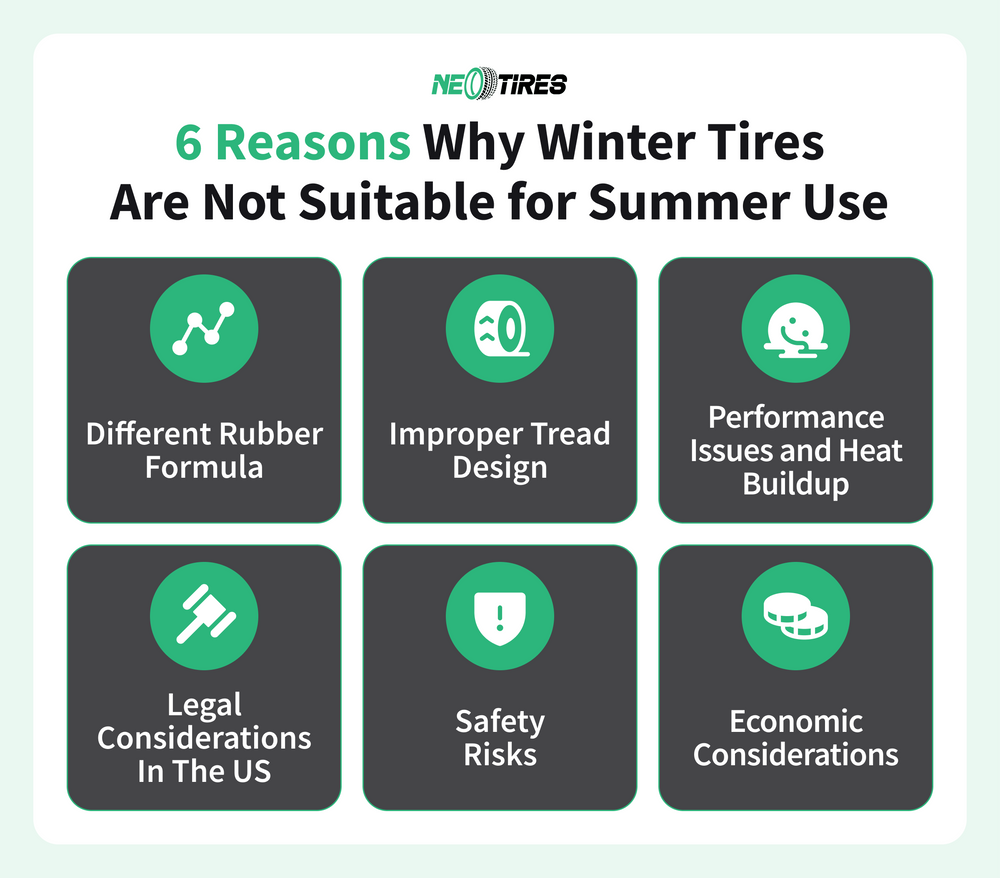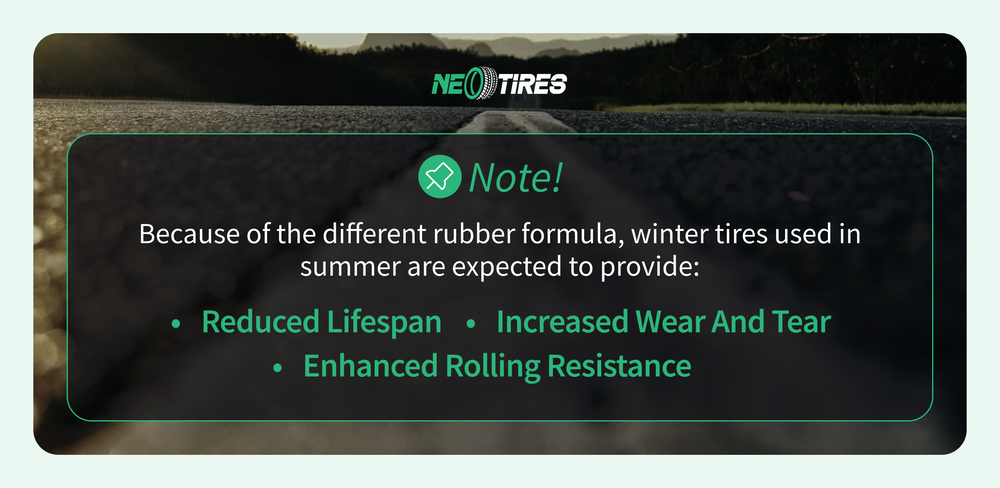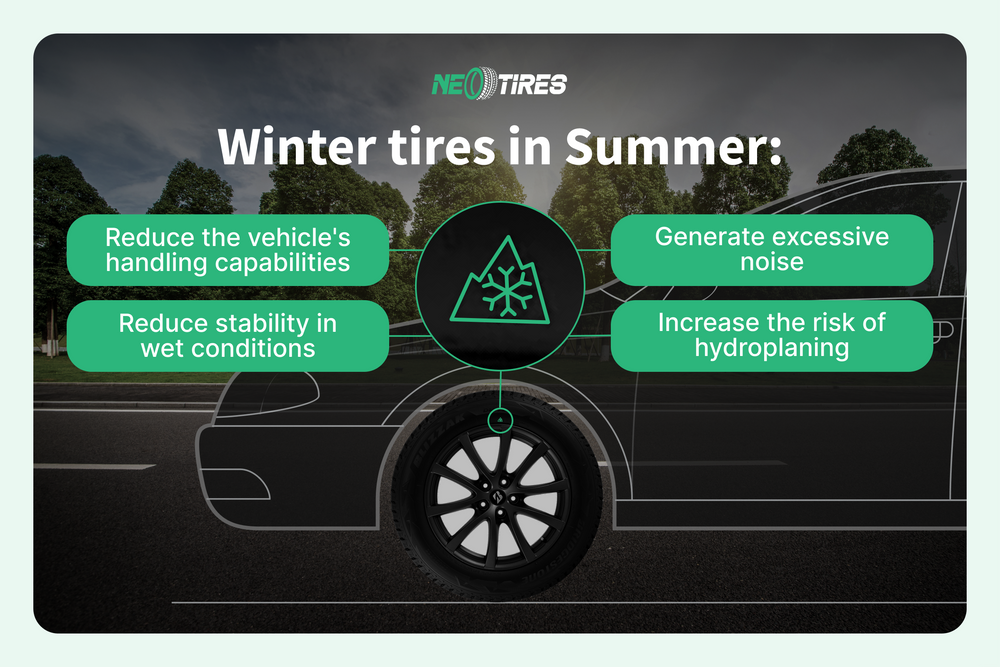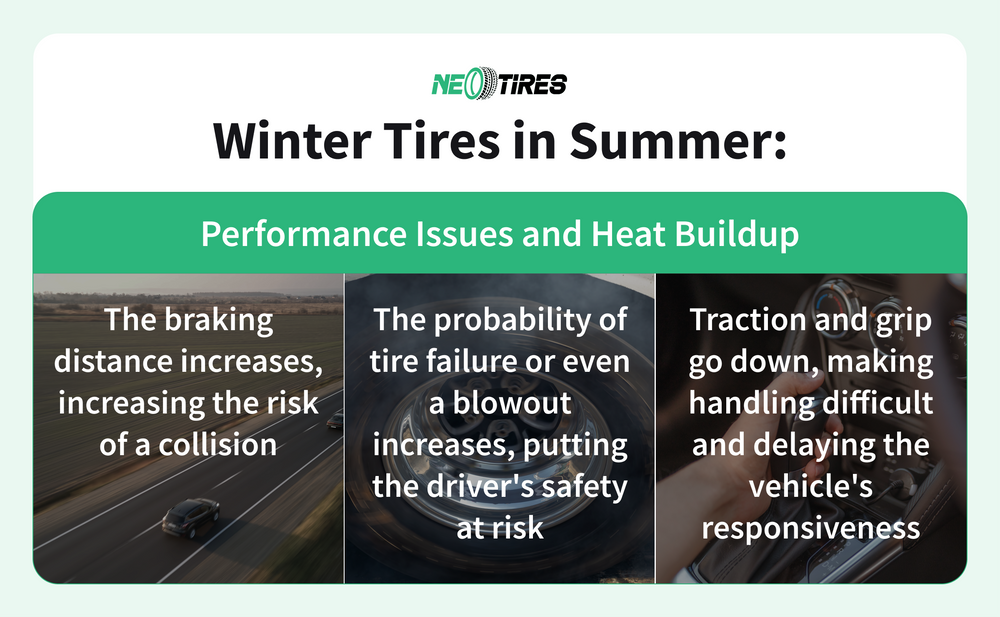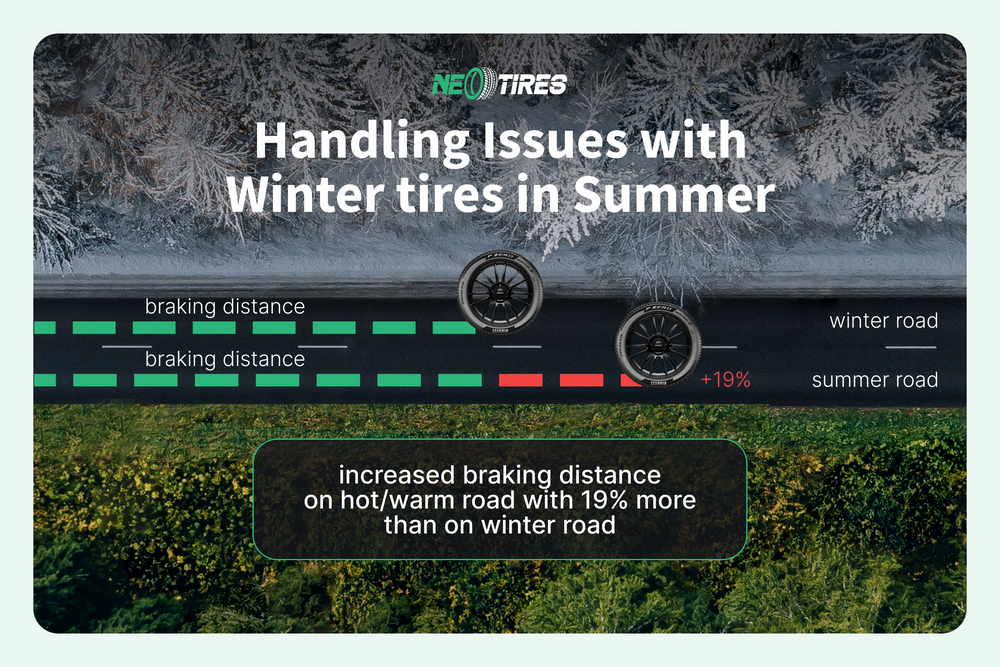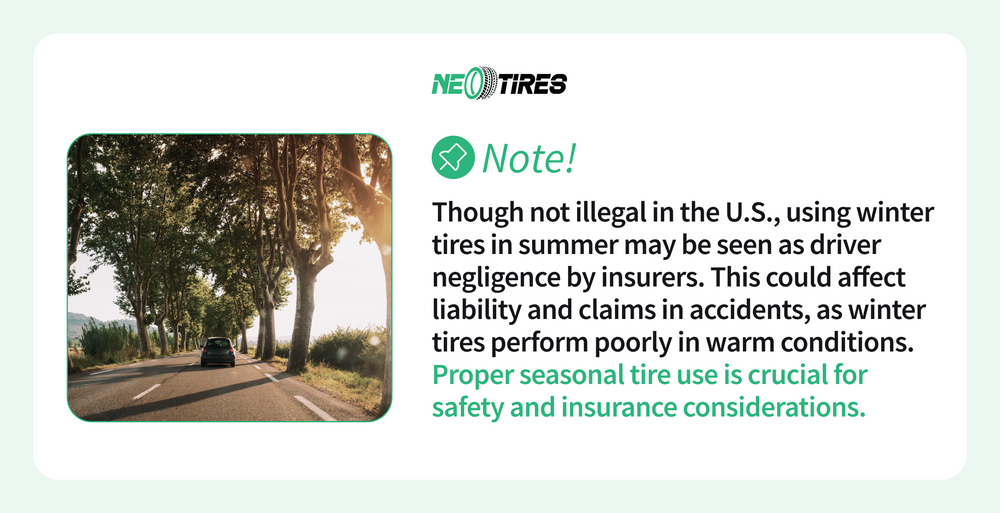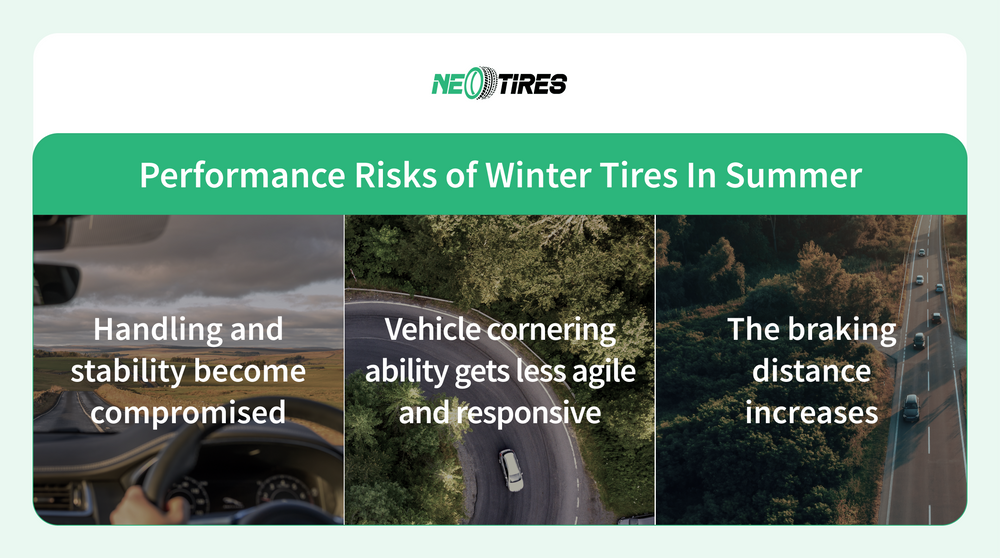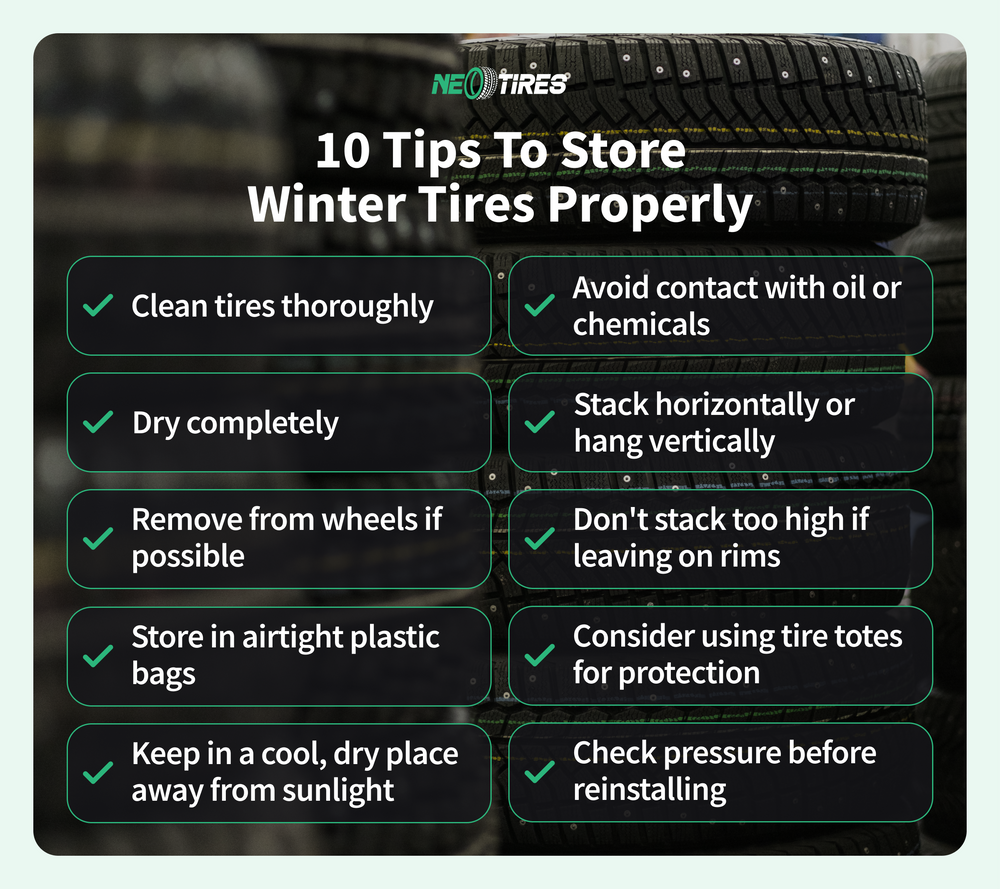Winter tires are specifically designed to withstand freezing temperatures and icy roads. Their formula and architecture are not meant for the hot seasons, and using them in summer is a costly and potentially unsafe choice. This section explores why winter tires are unsuitable for summer and what alternatives drivers have for optimal performance and safety.
6 Reasons Why Winter Tires Are Not Good for Summer Use
There are at least six reasons why winter tires should not be used in summer: unsuitable rubber formula, improper tread design, excessive heat build-up, US legal considerations, economic reasons, and safety risks.
Winter Tires in Summer: Improper Rubber Formula
The flexibility of winter vs summer types of tires is different. Summer tires resist well to high temperatures, and winter tires become way too flexible in hot weather, as per Bridgestone and Continental. Consequently, winter tires used in extreme heat bring about at least 3 adverse effects: wear faster, last shorter, and increase rolling resistance.
Winter Tires in Summer: Improper Tread Design
The winter tires' architecture is optimized for ice and snow performance. For example, their deep and wide grooves and aggressive tread blocks efficiently bite through snow and ice. Such tread design isn't meant for hot and smooth summer roads and the consequences are the following:
- reduced handling
- excessive noise
- high risk of hydroplaning
- low stability in wet conditions
Alternatively, summer tires come with a lower void ratio, more streamlined patterns, and optimized continuous shoulder blocks. These aid summer tires in better handling summer driving conditions.
Winter Tires in Summer: Heat Buildup
Using winter tires in the summer will make them overheat even at small distances. Heat build-up with winter tires in summer is likely to increase the braking distance, enhance tire failure/blowout probability, and delay the vehicle's responsiveness.
A Traffic Injury Research Foundation study found that the braking distance of a winter tire in summer is longer by 9.8 % compared to an all-season tire. Similarly, an all-season tire stops at 26.2% shorter than a winter tire in hot wet conditions.
Winter Tires in Summer: US Legal Considerations
The United States does not prohibit by law the use of winter tires in summer, unlike some European countries like Germany. However, drivers should avoid doing so because of related regulatory issues that might arise. Here are some examples:
State Regulations
California and several other states have strict regulations regarding tire integrity including tread depth. Considering that winter tires wear excessively in hot weather, the driver can be indirectly held responsible for using tires in unsuitable conditions;
Safety Responsibility
Using winter tires during the summer could be seen as an act of negligence in the context of a potential accident. While not U.S illegal, the driver could be held liable, especially if he is aware of the potential risks;
Insurance Implications in the US
In most cases, insurance policies do not provide for the seasonal use of tires as a specific clause. However, what they do mention are strict clauses regarding vehicle and tire maintenance in a safe condition. Using winter tires in summer could be categorized as negligence towards vehicle safety conditions as it indirectly can affect vehicle performance;
Potential Coverage Issues
An insurance company could deny a claim if it can prove that the winter tires during summer contribute to a potential accident. In addition, the driver could be held accountable for violating the policy maintenance clauses.
We recommend that drivers consult the laws of the US state in which they live as well as their specific insurance policies.
Winter Tires in Summer: Safety Risks
Winter tires perform differently from summer tires in high-temperature conditions. ResearchGate studies have shown that friction generated by the deeper tread of a winter tire generates a release of energy in the form of heat. Grip reduction is a natural consequence of this heat build-up. Handling is compromised, cornering is less stable, and breakng distance is longer-which all present high safety risks for the driver.
Winter Tires in Summer: Economic Considerations
When using winter tires in summer, the driver is likely to change his tires more often due to premature tire wear of the winter tires. The vehicle is likely to require repair of the suspension system components in the long run. The rolling resistance with winter tires in summer is highly higher, which puts additional strain on the driver's wallet.
Should You Drive Winter Tires In Summer?
No, winter tires are not a safe option in summer because of the improper tread design, unsuitable formula, higher rolling resistance, and performance deficit. Consider the following three alternatives to ensure summer driving safety and performance: switch to specialized summer tires, consider all-season tires, and store winter tires properly during the off-season.
Can You Use Winter Tires in Summer?:
Technically, you can run on winter tires in summer. Yet, this yields a series of adverse effects that do not justify the possible advantages. These tires are ill-suited for summer driving conditions because their main purpose is performance on snow, ice, and low temperatures.
The risks you can expect go far beyond just higher rolling resistance, early wear, or tire failure. These also include high safety risks that no driver should assume. Even in the absence of laws that would prohibit their use in summer, we recommend prioritizing safety and performance.
Summer driving should go hand in hand with appropriate summer/all-season tires. This brings the benefit of better traction, high-speed stability, and optimal fuel efficiency. After all, tire selection must be based on specific driving conditions, vehicle specs, as well as the climate environment. So, using winter tires in summer goes against these premises.
Ready for the Right Tires, No Matter the Season?
Choosing the right tires for the season is essential to ensuring optimal performance and driving safety on any road. If you need to equip your vehicle with the correct set, NeoTires can help you with just a few clicks.
At NeoTires, we offer a wide selection of tire products for various seasons and driving conditions. Explore us or contact our assistants for quick, professional guidance!
Why Trust Us?
NeoTires experts aim to provide readers with unbiased tire information and ratings. The team's evaluations are not influenced by any sponsors or manufacturers. NeoTires' editorial content includes data-driven methods to evaluate tire durability and performance under various conditions of various products. Learn more about Tire Durability in our research article.
All evaluations are performed equally between brands and models without subjective or partial attitudes. Accessing the links lets you learn more about Our Story, Mission, and How We Work. Also, consider that the information exposed in this article is entirely inspired by official sources like Bridgestone and Continental and NHTSA. Drive safe and choose your tires wisely!




